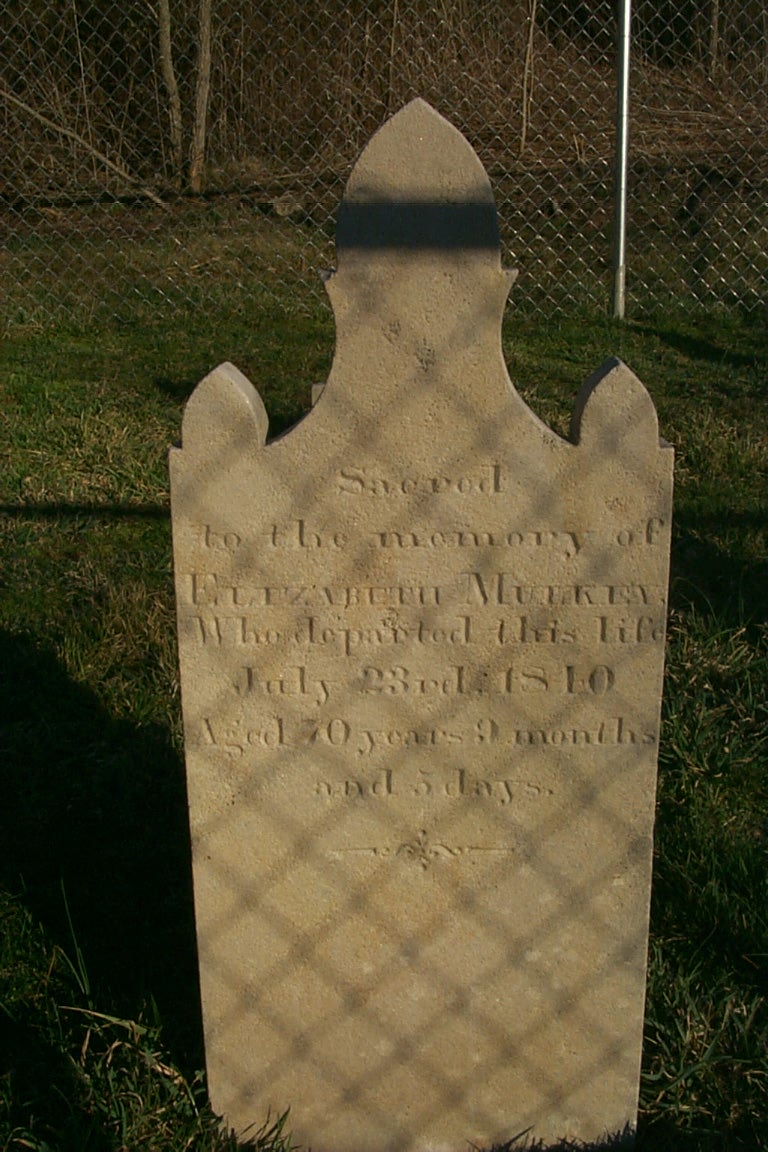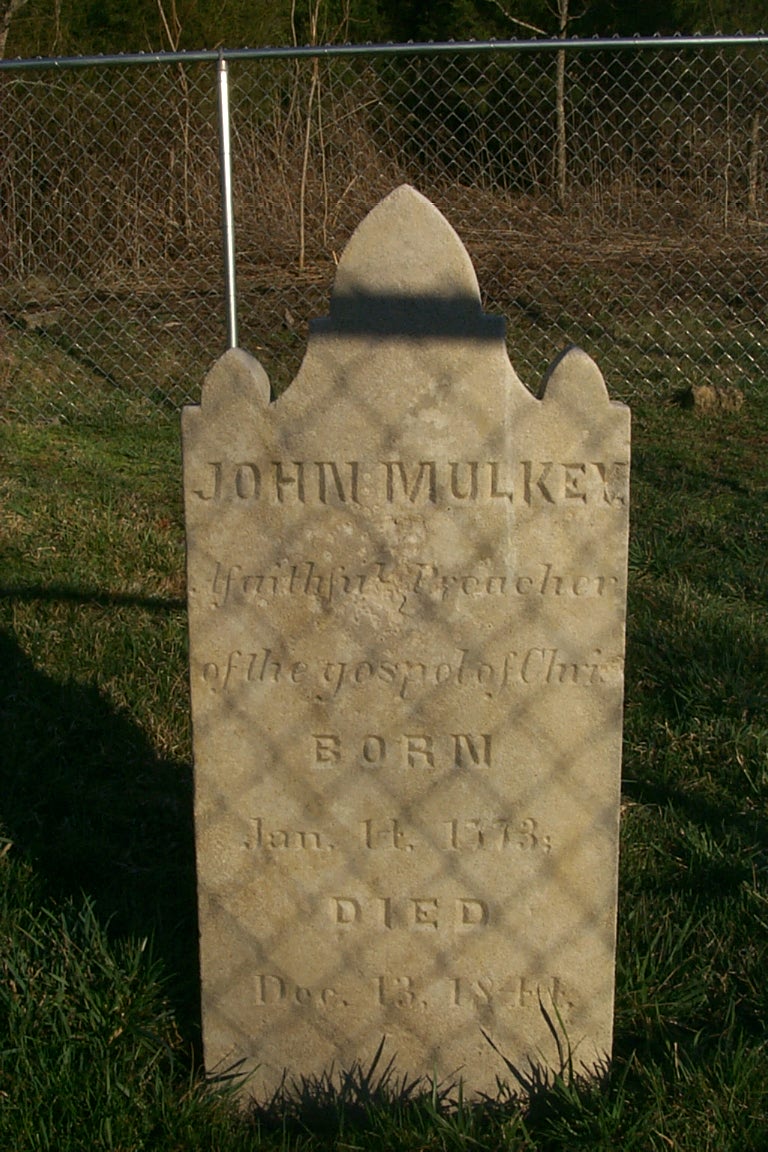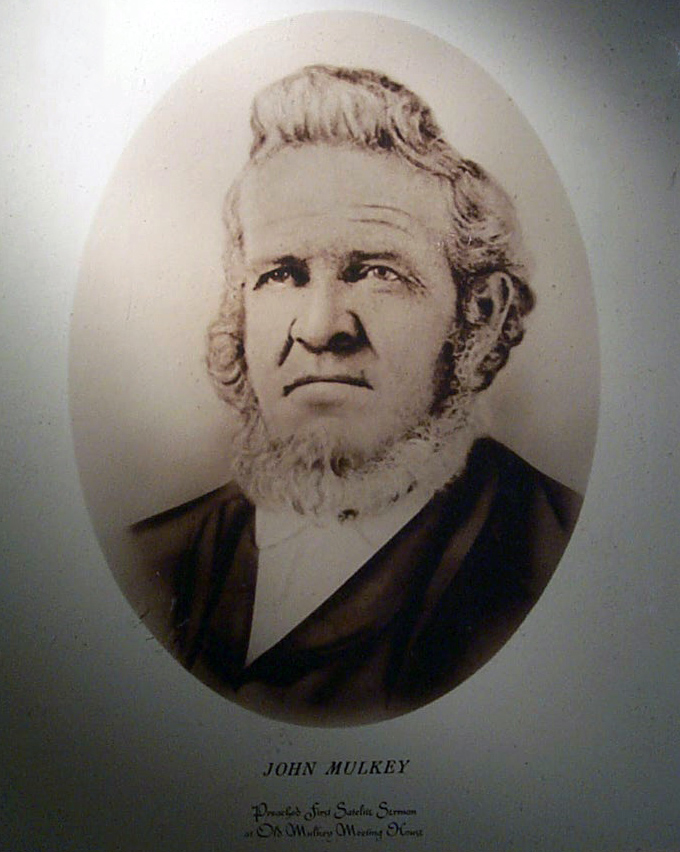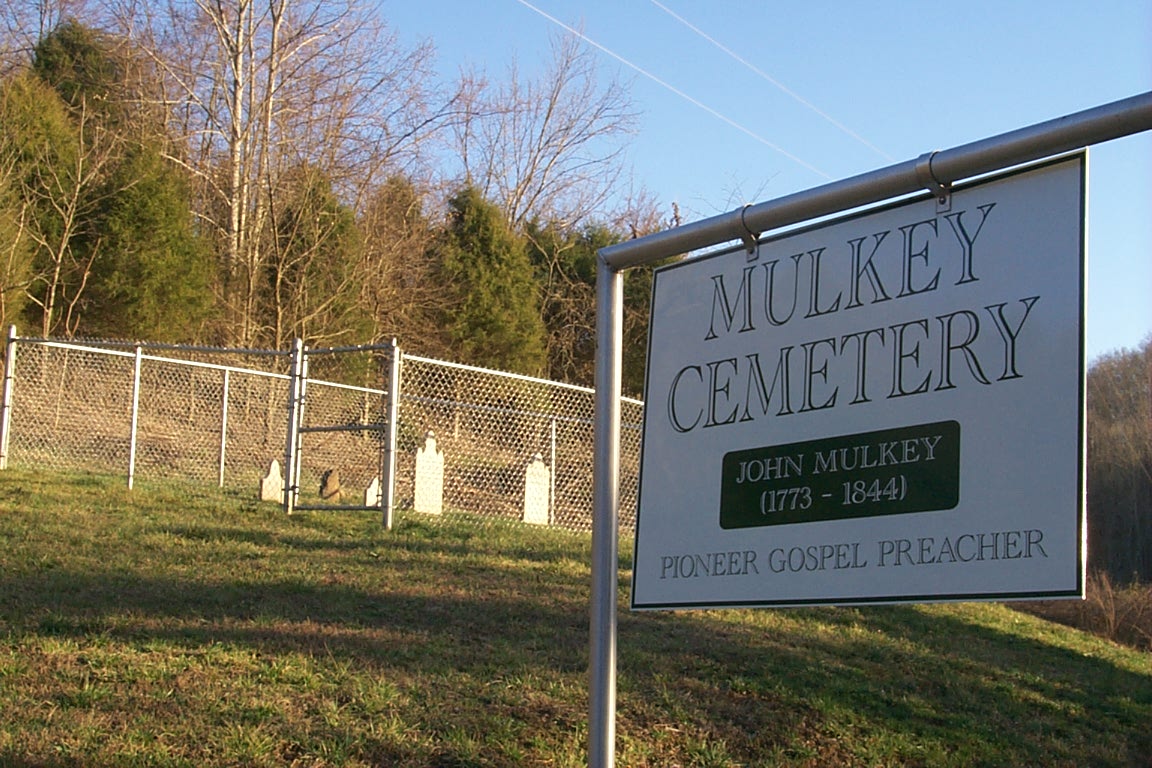John Mulkey
1773-1844
Elizabeth Mulkey
1770-1840

Elizabeth "Betsy" Hayes (Hays)
1769-1840
![]()
1845 Obituary From Christian Review
Tompkinsville, KY., MARCH 5TH, 1845.John Mulkey was descended from a preacher's family. His grandfather, Philip Mulkey, was a Baptist preacher, of respectable talent, in the Meherrin Association, so early as the year. 1756. Semple's H. Va. B. p. 222.
Philip Mulkey's son Jonathan became a preacher, perhaps in South Carolina; but finally located in E. Tennessee, and soon distinguished himself as one of the most eloquent, pious and virtuous Baptist preachers in the State. Three of his sons became preachers! and he was blessed with the singular happiness of being associated, in his old age, in preaching, with his Father and his own son John, in the same pulpit, and on the same day.
John Mulkey was born in S. Carolina, Jan. 14, 1773; commenced preaching in East Tennessee, in the 20th year of his age; and by close application to his Bibles soon became a very popular Baptist, preacher. He and his brother Philip, who was one of the most zealous and pious preachers of the age, removed to Kentucky early in the present century, These two brothers in the flesh, in the Lord, and in the proclamation of the Gospel, soon "obtained a good report." —But in the year 1809, John “expressed a change in his sentiments on unconditional election, and some other subjects.” This was the beginning of sorrows in the Baptist church! “At the Aug. meeting, 1809, they agreed to call on fine sister churches to assist them. The following Oct. meeting was the time set. The churches sent their delegates; the subjects were investigated; and the question put—‘For all who justify Bro. John Mulkey to hold up their right hands;’ but the majority being in his favor, no more could be done then. But the 2nd Saturday in November, he proposed to drop all disputes, and bear with each other—they replied, ‘Never till you come back to the very ground from which you. started.’ He then proposed a dissolution of the church, to which there was not a dissenting voice. Those that were determined to stand on their` old ground, were called to have their names enrolled as the church. But John Mulkey called on all who were determined to withdraw from all human creeds, and stand on the Bible, to give place for the others to act in their own way.— They met on the next Saturday, and, after solemn prayer to Almighty God, organized themselves into a church on the Bible alone.” After this start for Reform, John and Philip Mulkey bore all opposition with Christian fortitude, persevered in well doing, and sowed the seeds of reform with a liberal hand. And though small was their beginning, they soon gathered a mighty host. And when Bro. A. Campbell appeared upon the arena, they took courage, and zealously and successfully contended for a consummate “Restoration of the ancient order of things in the church.”
John Mulkey spent the most of his time in preaching till about three years ago, when his health became so precarious that he was compelled to desist.—The last year he was confined to his home, and the delightful company of his intelligent, pious and virtuous wife. He frequently and freely conversed with her on the subject of his “Departure for the land of rest,” as he called it. Told her he had not dreaded death since he became a Christian; but that he was more than ordinarily willing to change worlds at this time. And to one of the Elders he said— “You cannot think how willing I am to die”! Some days previous to his “departure,” he requested his beloved to have two of his most favorite pieces sung while he should be dying; the one beginning—“Jesus, thou art the sinner's friend”—the other, “The angels that watch'd round the tomb.” But when his final dissolution came on, the friends were so immersed in grief for the dying father, saint, Evangelist, that they could not sing. So in the midst of children, grand-children, brethren, and weeping friends, he calmly fell asleep in Jesus—Dec. 13, 1844—15 m. before 1 o'clock, A. M. Father Mulkey delivered, in 51 years, upwards of 10,000 discourses himself, and left two sons eminent preachers, and a grandson just commencing. Will they imitate his noble example? That they, and many more, may imitate it, is the prayer of the writer, ISAAC T. RENEAU,
Will the Christian Journal please copy this? —Christian Review, Vol.II, no.5 May, 1845,p.120 / Also, Millennial Harbinger, Vol. 2 No. 8, August, 1845, page 380.For more explanation see The Mulkey Meeting House page.
![]()
Letter From John Mulkey's Daughter Before He Died
The following was received from Bro. Mulkey's daughter in Illinois, and read to him while he was dying, but still conscious and able to understand:
DEAR FATHER:—It is with a sad heart I write these lines to you at this time. I could write to others of the family all I would write to you, but as I am deprived of sitting by you and talking with you of the sufferings and conflicts of this life, and of the bright hope beyond, I wish to write to you.
I have many things I would like to say to you. The first and most important of ail is. that i thank you from the bottom of my heart for the manner in which I was brought up; for the Christian influence which you exerted over me in my earliest days, and for your encouraging me to fidelity. How often have I thanked God that I was blessed with such a father and mother! Who could tell what I might have been had I not been so blessed? It encourages me to exert a Christian influence over my own children. They may see the folly of their way and turn to God, who will abundantly pardon. You cannot know how much I wish to be with you, and especially now, that I might help wait on you, and in some measure return the kindness which you have so often bestowed on me. But alas! Many miles stretch between my willing hands and your suffering frame. I know you will be well cared for; you have those around you that will not forsake you, that cannot forget you; and therefore I will try to submit to my lot in this distress and in all others. We have much in this life that is hard to bear, but it is short—it will soon be over—and then, if faithful, we shall enter into that blissful eternity where the weary are at rest.
Do not suffer any uneasiness about me, dear papa, for I am fixed in my purpose. I will not let anything prevent my devotion. I will, by the grace of God, stand firm as a rock to the last. I will "run with patience the race that is set before us, looking to Jesus, the author and finisher of the faith." I cannot preach, but I can talk to those around me, and encourage them to fidelity, and in my humble way I will do all I can to bring souls to Christ. Now, dear papa, I shall have to say farewell! and if it is for the last time in this life, I feel sure that we shall meet again, and as the poet says—
"Just so our pleasant friendship leaves
A fragrant memory;
And among life's garnered sheaves
For long eternity,
May not we at last discover,
'Tis for us a joy forever?"
Your loving daughter,
LYDIA LISENBY.
-Rogers, WIlliam, Recollections Of Men Of Faith, pages 227-229
![]()
Chronology on the life of John Mulkey
1755
Shubel Stearns (1701-1771), a George Whitefield convert during the 1st Great Awakening in New England moved from Okehon, Virginia to Sandy Creek, Guilford County, North Carolina. He founded Sandy Creek Baptist Church, a Separate Baptist Church. The church became the mother church of Southern Baptist Churches in America. One of Stearns' early converts Joseph Breed became his associate minister, and was the maternal great-grandfather of John Mulkey. Another convert was Breed's son-in-law, Philip Mulkey.
1756
Philip Mulkey, grandfather of JM, began preaching among the Baptists in the Meherrin Association (according to Semples' History of Virginia Baptists, p.222., as reported in Millennial Harbinger, 1845, p.380)
1759-1760
Philip Mulkey became an ordained minister of the Deep River Baptist Church.
1762
December
Philip Mulkey organized the first Baptist Church in Fairforest, South Carolina. (B.J. Humble, "The Old Mulkey Meeting House." (Firm Foundation, p.324, 3.)
1765 or 1776
Believed that Mill Creek Baptist church (Separate Baptists) is begun by Philip Mulkey, grandfather of John and Philip Mulkey, in a mission effort from South Carolina. (Cecil N. Wright, Freed-Hardeman College Lectures, 1984. p.328)
1773
January 14
John Mulkey is born in the Fairforest region of upper South Carolina. This area was where his grandfather, Philip and his father Jonathan had conducted an enterprise to evangelize among the region. (Millennial Harbinger, 1845, p.380)
1775
By late 1775, due to the Revolutionary War in progress, the missionary work of Philip and son, Jonathan Mulkey, had to be abandoned. The family was forced to move to northeast Tennessee to evangelize. Jonathan was the first or "second" (O. W. Taylor, Early Tennessee Baptists, p. 62) Baptist preacher to preach in the state of Tennessee, preaching at Buffalo Ridge Baptist Church for 42 years and at the same time preached at Sinking Springs Baptist church 31 or 32 years. (Cecil N. Wright, Freed-Hardeman College Lectures, 1984. p.326)
1793
JM began preaching among the Baptist in his 20th year. (Millennial Harbinger, 1845, p.380) He was one of three brothers who preached.
1793
Marriage to Elizabeth "Betsy" Hayes (Hays) at Jackson, Tennessee
1797 or 1798
A small church building is built for the Separate Baptists at Mill Creek.
1798
Around 1800, JM and brother Philip (2-3 years younger) moved to Monroe County, Kentucky, and settle on Mill Creek, about two miles SE of Tompkinsville. (Jo B. Green, Gospel Advocate, April 29, 1909, p.540)
1801
Mill Creek Baptist Church was organized with a merger between Separate Baptists (of which the Mulkeys were identified) and Regular Baptists, accepting with reservations that Philadelphia Confession of Faith of the Regulars. John Mulkey became the preacher, and Philip the deacon and clerk. (Cecil N. Wright, Freed-Hardeman College Lectures, 1984. p.326) 175 members (Peggy S. Holly, Encyclopedia of the Stone-Campbell Movement, p.547,548)
1802
Philip Mulkey moved to Jackson (now Clay County), just a few miles away in northern Tennessee, and began preaching for the Brimstone Baptist Church. (Cecil N. Wright, Freed-Hardeman College Lectures, 1984. p.327)
1804
April 15
Mill Creek Baptist Church records show a committee of seven men were appointed to erect a new church building. John Wood, Nathan Breed, James Harlin, Ephriam Ellis, Francis Baxter, Joseph Gist, and Thomas Sullivan were named to the committee.
1804-1805
Built the Mill Creek Baptist church meetinghouse. Now called Mulkey Meetinghouse.
Around this time he is reported to have been riding along when he met a man named Christian Fraley. After talking about the Bible, they came to a creek where in the words of the Eunuch of Acts 8, said, "See, here is water, what hinders me from being baptized?" He stopped there at the creek and baptized him. (Jo B. Green, Gospel Advocate, April 29, 1909, p.540)
1806
February 11
John Newton Mulkey was born two miles east of Tompkinsville, Ky. And was baptized in early life by Samuel DeWhitt. (Recollections of Men of Faith, Isaac T. Reneau, p.226).
1809
After 16 years among the Baptists, JM begins speculating and expresses changed in his views on the Calvinistic doctrine of unconditional election. (Millennial Harbinger, 1845, p.380)
The story goes that while in the home of William Sims, on the Cumberland River, JM was making an impassioned plea for Calvinism from John 10:30-31, when he saw that the Scriptures were not as supportive of Calvinism as he had thought. (Jo B. Green, Gospel Advocate, April 29, 1909, p.540)
1809
August
JM attends a heresy meeting of the Stockton Valley Baptist Association. He was found innocent, but five other congregations of the Baptist church are called upon to try JM for heresy. Trial was set for the following October.
1809
September 9
Second Saturday in September was the original set date for heresy trial to begin. Meeting was postponed to the second Saturday in October. (Guy N. Woods, Gospel Advocate, September 17, 1981, p. 547)
1809
October
Stockton Valley Baptist Association trial of JM. He made his appeal to take the Bible alone as only standard. The proposition was made that "all that justify Bro. Mulkey to raise their right hands." The majority was in favor, so a new trial was set for second Saturday in November.
1809
November 11
At the Baptist church trial, "John Mulkey proposed to "drop all disputes and bear with one another," but they replied, "Never, till you come back to the very ground from which you started." He then proposed a dissolution of the church, to which all agreed; and as many as wished to continue on, their old platform, enrolled their names as ‘The Church.'" (Recollections of Men of Faith, Isaac T. Reneau, p.226)
1809
November 18
Third Saturday in November - It was at this meeting that JM told the group he would exit through one door, and all who would follow him out would assert to the Bible alone for Bible authority) Estimated that 150 of the 200 members walked out the western door with JM. The 50 left in the building departed and organized the Baptist Church in Tompkinsville, that continues to this day.
1810
December 15
Meeting at Mulkey Christian Church – Present was Joseph Thomas, the "White Pilgrim," Reuben Dooley, and Mulkey. Thomas went on to Cane Ridge, and then to Philadelphia where he met Elias Smith (The Life of the Pilgrim, Winchester, Va, 1817, p.59ff)
Soon after the 1810 visit with Thomas, JM makes a trip to Cane Ridge to meet B.W. Stone. Preaches there and at Old Concord. John Rogers wrote of being impressed with Mulkey as an orator. "He had a splendid voice, and sang, and preached, and prayed most admirable." (John Rogers, Recollection of Men of Faith, by William C. Rogers, page 186.) It is suggested by some that Joseph Thomas assisted strongly in cementing the movement of JM and BW Stone.
1822
JM baptized Mansel W. Matthews, a school teacher, in Kentucky. Later, Matthews was a leader in the church in Waterloo, Alabama. He joined the group that moved to establish N.T. Christianity in Texas in 1836. (J.W. Roberts and R.L. Roberts, Jr., "Like Fire In Dry Stubble – The Stone Movement, 1804-1832 Part 1, p. 157)
1824
October 7
John Newton Mulkey, son of JM, married Nancy Laugh. (Recollections of Men of Faith, Isaac T. Reneau, p.227)
1826-1834
JM moved to McMinn County in lower East Tennessee. Continued to evangelize, often traveling far and wide to preach the gospel.
1832
September 23
JM preaching in Hopkinsville, Ky – (Christian Messenger, p.298) He is reported to be riding "nearly constantly." (p.300)
1833
September 27-29
JM preaching with W.D. Jourdan and John Steele at Burkesville, Kentucky where they baptized 22. (Millennial Harbinger, 1833, page 525)
1835
Philip moved to southern Illinois and founds Mulkeytown. As founding father for the town, he was also the planter of Restoration in that part of the state.
1839 or 1840
JM in his 68th year goes with a young Allen Kendrick to Fayette, Jefferson County, Mississippi to preach. He baptizes several, including a young T.W. Caskey. (B.F. Manire, Churches of Christ, "Mississippi," p.255). Caskey reports this to John R. Howard, editor of the Bible Advocate. January 4, 1847. (Bible Advocate, February 1847, page 28).
1841
Decline in health prevents JM from traveling to preach.
1843
John Newton Mulkey, along with Sandy E. Jones preached a meeting in Tompkinsville. 132 made the good confession and were baptized. (Recollections of Men Of Faith, Isaac T. Reneau, p.214.) The church is established in Tompkinsville.
1844
December 13
12:45 am
"surrounded by a wife, children, grandchildren, brethren, and weeping friends, he calmly fell asleep in Jesus, December 13, 1844, 15 minutes before 1 o'clock A. M. Father Mulkey delivered, in 51 years, upwards of ten thousand discourses himself, and left two sons eminent preachers, and a grand-son just commencing." (Isaac Reneau, Millennial Harbinger, 1845, p.370) It was estimated that he preached nearly 10,000 sermons and baptized as many in his 51 years of preaching. This was similarly said of his son, John Newton Mulkey.
1844
Philip Mulkey, brother of JM died in Mulkeytown, Illinois and is buried in Old Mulkeytown Cemetery.
1855
Summer
John Newton Mulkey baptized 105 people in a five-day meeting near Celina, Tennessee. It was estimated that, like his father, he preached nearly 10,000 sermons and baptized as many people in 53 year of ministry. (Recollections of Men Of Faith, Isaac T. Reneau, p.227)
1875
The church of Christ discontinued their meetings at Old Mulkey. A congregation had been established in town by John Newton Mulkey in 1843. The small group discontinued meeting in the meetinghouse and joined with the brethren in town. (Guy N. Woods, Gospel Advocate, September 17, 1981, p. 565)
1954
October 28
The 50th Anniversary edition of Tompkinsville News declared there were no less than 26 congregations of churches of Christ in Monroe County. (Cecil N. Wright, Freed-Hardeman College Lectures, 1984. p.326)
![]()
Genealogy – Preachers
Philip Mulkey – Grandfather (1732-1801) Baptist
Jonathan Mulkey – Father (1752-1826) Baptist
John Mulkey (1773-1844) & Philip Mulkey (1776-1844) Baptist – then Church of Christ
John Mulkey's Sons:
Jonathan Mulkey (1795-1860)
John Newton Mulkey (1806-1882)
Philip Mulkey (1802-1893)
Church of Christ
![]()
Directions To The Mulkey Graveyard
From Knoxville: Travel on I-40 to Cookeville Exit #288. This will be highway 111 & 42. Head north toward Livingston, Tennessee. Go about 20 miles, and as you enter Livingston, Hwy 42 will turn left and by-pass downtown. Go a couple miles on the by-pass and turn left on Hwy 52 heading toward Celina. Travel 18 miles and follow the Hwy 52 signs all the way through Celina (goes through the downtown area). From Celina travel 8.5 miles crossing the Cumberland River toward Moss. As you pass through Moss the road will fork. Hwy 52 goes back to the left and Hwy 53 goes straight ahead. Go straight on Hwy 53 heading north 1.9 mile to the Kentucky State Line. Continue another 3.2 miles into Kentucky on what has now become Hwy 163. (Hwy 53 in Tennessee = Hwy 163 in Kentucky). Then turn right on Hwy 216. At this point you are 6.7 miles from the graves. When you have passed Hestand Church of Christ on the left you still are 3 miles away. You will be traveling through a valley and will see the entrance next to a small creek bed on your left. The entrance will be in the form of a triangle with trees growing in the middle. Go 100 feet up the little pig trail that goes up by the creek bed and the sign and chain-linked fenced-in cemetery is on your right.
From Nashville: I-65 cross over into Kentucky and take the second exit which should be the Franklin exit. At the exit turn right on Hwy 100. The road has some pretty rough turns but after 60 miles you will come into Tompkinsville. Off Hwy 100 turn south on Hwy 163. Travel 5.4 miles just past the Germany Church of Christ and turn left on Hwy 216, then 6.7 mile on your left. See more details above.
GPS: 36.649463,-85.524993
![]()

Sacred
to the memory of
Elizabeth Mulkey
Who Departed This Life,
July 23rd, 1840
Aged 70 years 9 months
and 5 days

John Mulkey
A faithful preacher
of the gospel of Christ
BORN
January 11, 1773;
DIED
December 13, 1844.
![]()
See Jonathan Mulkey's Site (John's Father)
See John Newton Mulkey's Site (John's Son)
![]()


